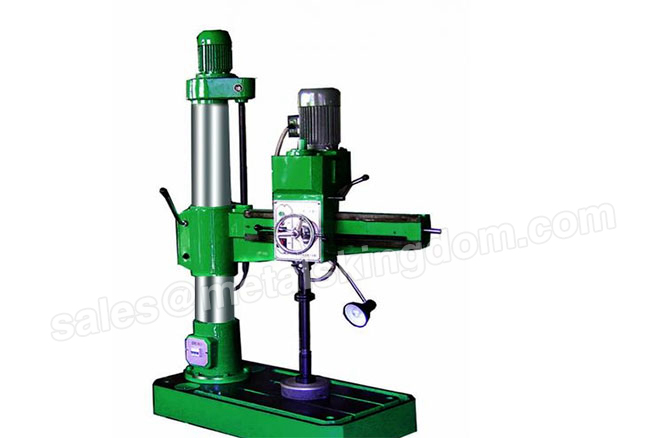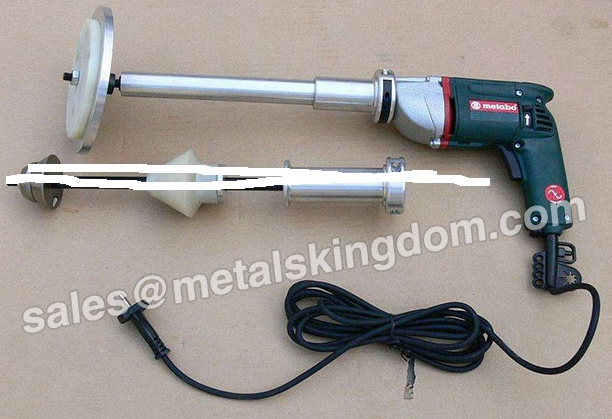The safety valve is affected by impurities or some strong impacts, resulting in friction and scratches between the valve disc and the valve seat, which will affect the sealing performance. So use a gate valve grinder machine to grind and flatten these two parts to restore their sealing performance.
Repair and maintenance of gate valve grinding machine
Oil-air filter dripping speed adjustment
When using an air motor, an oil and gas filter must be connected between the air source and the motor. The oil and gas filter has two main functions: the first is to filter out the water vapor in the air and prevent the internal rust of the air motor. The second is to enter the atomized lubricating oil with the air into the motor, so as to achieve the lubrication effect. The amount of atomized oil should be appropriate, too little will not provide lubrication, too much will overflow from the muffler, the adjustment method is as follows:
Use an Allen key to turn the oil volume setting button (position No. 5). Through the window below the oil volume setting button, you can see the oil dripping. The best rate is about 2 drops per minute.

Valve Grinding Machine
Adjust chain tension
As the machine is working, the chain will bear the load. When time is up, the chain will become longer. The most intuitive phenomenon is that there will be a rattling noise inside the arm. If it is more serious, the chain will be stuck and the machine will not be able to Rotate. So if the above phenomenon occurs, we have to adjust the tension of the chain, and the operation process is very simple:
1. Loosen the screws in the picture and remove the motor;
2. Remove the baffle;
3. After removing the baffle, we will see the chain fastening device. Use a 2.5 or 3 hexagonal small wrench to turn counterclockwise, and at the same time turn the other end of the universal joint by hand, the chain tension has a node, When we suddenly feel that the universal joint rotates unevenly, it means that we have just exceeded this node, and we only need to loosen the chain fastening device in the reverse direction slightly;
4. Reset the baffle and the motor to complete the chain tension adjustment.
Replace the drive shaft
When the grinding disc collides with the inner wall of the valve, the drive shaft will actively break, so as to protect the internal parts of the machine (such as chains, chain transmission gears, bearings, etc.). If the drive shaft is broken, the replacement method is also very simple. There are three steps in total:
1. Remove the drive motor;
2. Use a metal foil or screwdriver to fix the shaft inside the motor, and then directly use a wrench to unscrew the drive shaft at the front end;
3. Screw on the new driveshaft and install the motor on the machine to complete the replacement of the entire driveshaft.

Plane Globe Valve Grinding Machine
An Essential Procedure
Valve reconditioning can be carried out in-situ, with the valve still fitted to the pipeline system, or in the workshop. In-situ valve lapping and repair tends to be more efficient, as it eliminates the need to remove the valve from the system. The only time workshop maintenance is more efficient is when a major valve rebuild is required.
In-situ valve maintenance requires that the bonnet is removed, and that sufficient space is available around and inside the valve body. To make the best use of the available space, ensure that the equipment you buy is light-weight, able to fit in tight spaces, as well as easy to attach. Your time onsite should be spent grinding the valve, not mounting the valve grinder.
Grinding equipment for use in the workshop needs to be easy to operate and adjust, versatile for use on several applications, and be able to extend capabilities with additional accessories for specialized applications.
Preparing for the Procedure
The following step-by-step procedure describes how to prepare the valve, as well as the basic steps to take in valve grinding and lapping:
1. Cover the area under and around the valve with plastic sheeting to prevent loss of parts and to contain dirt and grease.
2. Begin dismantling by removing any lagging. Clean the outside of the valve. Remove any rust and paint from nuts and bolts. Lubricate the bolts with penetration oil. Try to avoid any damage to the fasteners – even just one damaged nut will add an inordinate amount of downtime and cost.
3. Dismantle the interior parts of the valve. Clean, check and mark to ensure correct refitting. Clean the inside of the valve body, removing rust and any residual liquid. Check gaskets for cracks, corrosion, and defects.
4. Start the grinding by machining any large defects on the surface of the valve seat. Grind defects with portable valve grinders, using appropriate abrasives based on seat material and condition.
5. Remove grinding dust from the valve.
6. Leak-test the valve, ensuring it meets current standards.
7. Reassemble and refit the valve to its original position. Make sure the actuator still works.
8. Finally, write a report on the performed procedure.
We are a Gate Valve Grinder Machine supplier, please feel free to contact us if you need them.






Comments
0